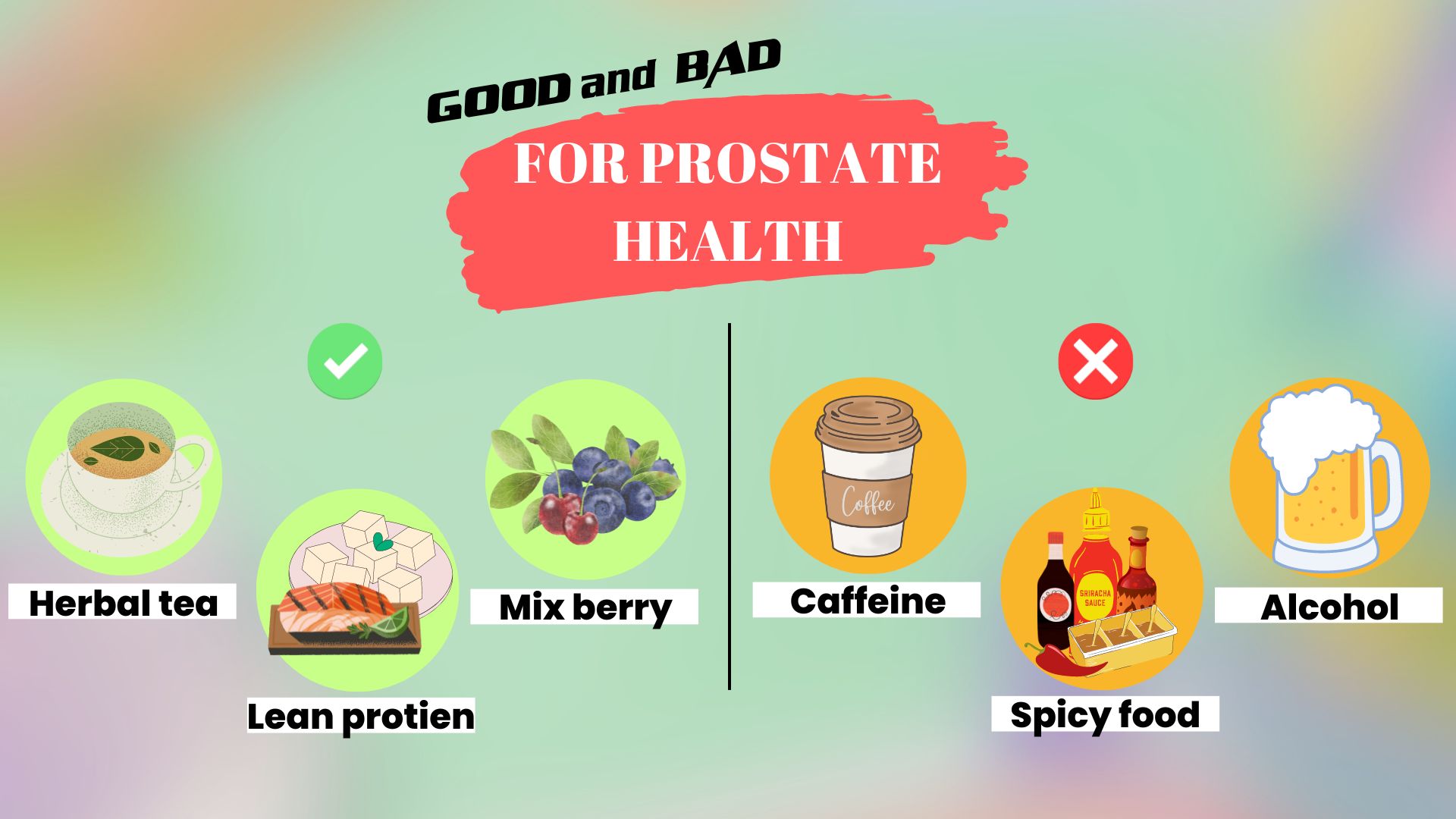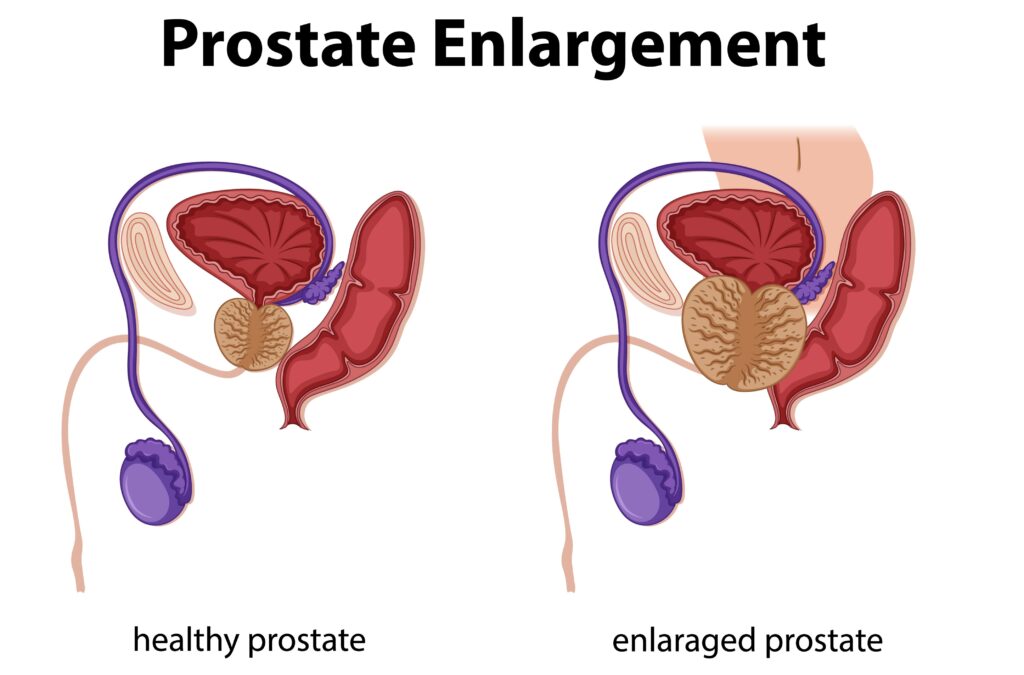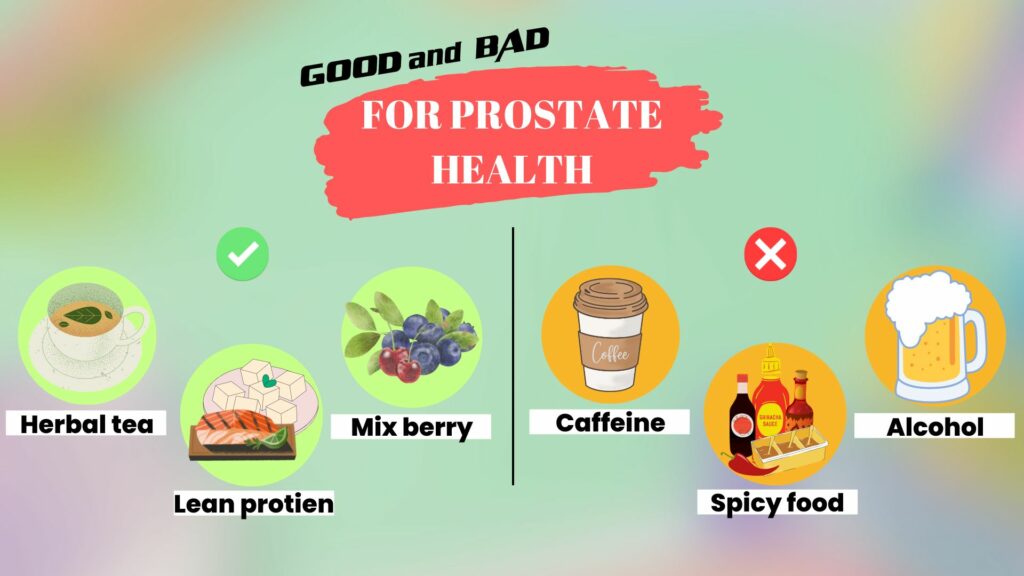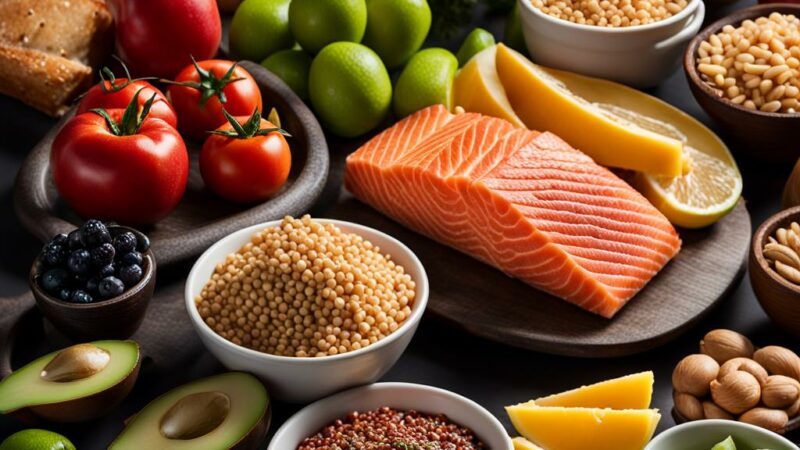
Prostate Health: Dietary Tips for BPH Relief
Benign Prostatic Hyperplasia (BPH), also known as prostate gland enlargement, is a common condition among aging men. It occurs when the prostate gland, which surrounds the urethra and produces seminal fluid, becomes enlarged, causing various urinary symptoms.
As men age, the risk of developing BPH increases, with symptoms often manifesting after the age of 40. Common symptoms of BPH include frequent urination, difficulty starting urination, weak urine flow, and the sensation of incomplete bladder emptying.
While BPH is not a life-threatening condition, its symptoms can significantly impact a man’s quality of life. Fortunately, dietary modifications can play a crucial role in managing BPH symptoms and promoting prostate health.
In this article, we will explore the importance of diet in managing BPH symptoms and provide valuable dietary tips to alleviate discomfort and improve urinary function for individuals living with BPH.

Understanding BPH Symptoms and Dietary Impact:
Benign Prostatic Hyperplasia (BPH) manifests through various symptoms that can significantly affect daily life. These symptoms include frequent urination, particularly at night (nocturia), a weak urine stream, difficulty starting urination, and the sensation of incomplete bladder emptying. Understanding these symptoms is crucial for identifying and managing BPH effectively.
Moreover, diet plays a pivotal role in influencing BPH symptoms and overall prostate health. Certain dietary factors can exacerbate BPH symptoms, while others may alleviate discomfort and promote prostate health. By understanding the dietary impact on BPH, individuals can make informed choices to manage their symptoms more effectively.
Incorporating Prostate-Friendly Foods into Your Diet:
When managing BPH symptoms, incorporating prostate-friendly foods into your diet can be highly beneficial. These foods are rich in nutrients and compounds that support prostate health and may help alleviate symptoms associated with BPH.
Some examples of prostate-friendly foods include:
- Tomatoes: Rich in lycopene, a powerful antioxidant known for its anti-inflammatory properties.
- Berries: Packed with antioxidants and vitamins that promote overall health and help reduce inflammation.
- Cruciferous Vegetables: Broccoli, cauliflower, and Brussels sprouts contain sulforaphane, which has been linked to reduced BPH risk.
- Fatty Fish: Salmon, mackerel, and trout are high in omega-3 fatty acids, which have anti-inflammatory effects.
- Green Tea: Contains catechins, which have antioxidant properties and support prostate health.
These foods are not only delicious but also offer a plethora of nutrients and compounds beneficial for prostate health. By incorporating them into your diet regularly, you can provide your body with the support it needs to manage BPH symptoms more effectively.

Avoiding Trigger Foods and Beverages:
While incorporating prostate-friendly foods into your diet is essential, it’s equally important to identify and avoid foods and beverages that may exacerbate BPH symptoms. Certain foods can aggravate inflammation or contribute to urinary symptoms associated with BPH, so being mindful of your dietary choices is crucial for managing your condition effectively.
Some trigger foods and beverages to limit or avoid include:
- Spicy Foods: Spicy foods can irritate the bladder and exacerbate urinary symptoms.
- Caffeine: Beverages like coffee, tea, and energy drinks can act as diuretics, increasing urinary frequency and urgency.
- Alcohol: Alcohol can irritate the bladder and worsen urinary symptoms, leading to increased frequency and urgency.
- High-Sodium Foods: Excessive salt intake can contribute to fluid retention and aggravate urinary symptoms.
- Processed Foods: Processed foods often contain additives and preservatives that may trigger inflammation and exacerbate BPH symptoms.
By being mindful of your dietary choices and avoiding trigger foods and beverages, you can better manage your BPH symptoms and improve your overall quality of life. Making simple adjustments to your diet can make a significant difference in how you feel and help alleviate discomfort associated with BPH.

Balancing Macronutrients for Prostate Health:
Achieving a balanced diet is key to supporting overall health and optimizing prostate function. By incorporating a variety of nutrient-rich foods into your meals, you can ensure that your body receives the essential nutrients it needs to function optimally, including those that support prostate health.
Balancing carbohydrates, proteins, and fats is essential for maintaining a healthy diet and supporting prostate function. Carbohydrates provide energy, proteins support tissue repair and immune function, and healthy fats contribute to hormone production and cellular function.
Here are some tips for creating balanced meals that support prostate health:
- Incorporate Whole Grains: Choose whole grains like brown rice, quinoa, and whole wheat bread, which provide complex carbohydrates and fiber to support digestive health and regulate blood sugar levels.
- Include Lean Proteins: Opt for lean sources of protein such as poultry, fish, tofu, and legumes, which are rich in essential amino acids and promote muscle health and repair.
- Choose Healthy Fats: Incorporate sources of healthy fats such as avocados, nuts, seeds, and olive oil, which contain omega-3 fatty acids and support heart health and inflammation reduction.
By prioritizing a balanced diet that includes a variety of nutrient-dense foods, you can support prostate health and reduce the risk of BPH-related symptoms. Making small adjustments to your meals can have a significant impact on your overall well-being and quality of life.

Hydration and Its Role in BPH Management:
Maintaining proper hydration is crucial for individuals with BPH as it supports urinary function and helps alleviate symptoms . Dehydration can exacerbate BPH symptoms by concentrating urine and increasing the risk of urinary retention and discomfort.
Here are some tips for staying properly hydrated and choosing prostate-friendly beverages:
- Drink Plenty of Water: Aim to drink at least 8-10 glasses of water per day to ensure adequate hydration and promote urinary flow. Sipping water throughout the day can help prevent urinary retention and reduce the severity of BPH symptoms.
- Limit Caffeinated and Alcoholic Beverages: Caffeine and alcohol can act as diuretics, increasing urine production and potentially worsening BPH symptoms. Limiting consumption of caffeinated beverages like coffee, tea, and soda, as well as alcoholic drinks, can help minimize urinary urgency and frequency.
- Opt for Prostate-Friendly Beverages: Choose hydrating beverages such as herbal teas, coconut water, and diluted fruit juices, which provide fluids without the diuretic effects of caffeine and alcohol. Herbal teas like green tea and chamomile may also offer additional benefits for prostate health due to their antioxidant properties.
By prioritizing hydration and choosing prostate-friendly beverages, you can support urinary function and alleviate symptoms associated with BPH. Incorporating these simple dietary habits into your daily routine can make a significant difference in managing your condition and improving your overall quality of life.

Incorporating Anti-Inflammatory Foods:
Inflammation plays a significant role in the development and progression of BPH symptoms, contributing to prostate swelling and urinary difficulties. Fortunately, certain foods and herbs possess anti-inflammatory properties that can help alleviate these symptoms and support prostate health.
Here’s how you can incorporate anti-inflammatory foods into your diet:
- Fatty Fish: Rich in omega-3 fatty acids, fatty fish such as salmon, mackerel, and trout have potent anti-inflammatory effects. Omega-3s help reduce inflammation in the body, potentially easing BPH symptoms and promoting prostate health.
- Turmeric: This vibrant yellow spice contains curcumin, a compound renowned for its powerful anti-inflammatory properties. Adding turmeric to your meals or consuming turmeric supplements may help alleviate inflammation associated with BPH and provide relief from urinary symptoms.
- Leafy Greens: Vegetables like spinach, kale, and Swiss chard are packed with antioxidants and phytochemicals that combat inflammation. Incorporating leafy greens into your diet can help reduce prostate swelling and support overall prostate health.
- Berries: Blueberries, strawberries, and raspberries are rich in antioxidants known as anthocyanins, which possess anti-inflammatory properties. Enjoying a variety of berries regularly can help reduce inflammation in the body and mitigate BPH symptoms.
By incorporating these anti-inflammatory foods into your diet, you can help alleviate inflammation associated with BPH and promote prostate health. Including a diverse array of these foods in your meals can contribute to symptom relief and enhance your overall well-being.

The Importance of Fiber for BPH Symptom Relief:
Fiber plays a crucial role in promoting digestive health and alleviating symptoms associated with BPH. A diet rich in fiber can help regulate bowel movements, reduce constipation, and alleviate pressure on the prostate gland, thereby easing urinary difficulties.
Here’s why fiber is essential for managing BPH symptoms and tips for increasing your intake:
- Digestive Health: Fiber adds bulk to stool and promotes regular bowel movements, which can help alleviate constipation and reduce pressure on the prostate gland. By maintaining healthy bowel function, fiber contributes to overall BPH symptom relief.
- Lowered Risk of BPH Progression: Research suggests that a high-fiber diet may be associated with a reduced risk of BPH progression. By promoting digestive regularity and reducing inflammation, fiber intake may help slow the progression of BPH symptoms over time.
- Increasing Fiber Intake: To increase your fiber intake, focus on incorporating whole foods rich in fiber into your diet. Foods such as fruits, vegetables, whole grains, legumes, and nuts are excellent sources of dietary fiber. Aim to include a variety of fiber-rich foods in your meals and snacks throughout the day.
- Dietary Supplements: In addition to whole foods, dietary supplements such as psyllium husk or fiber supplements may be beneficial for individuals looking to boost their fiber intake. These supplements can be easily added to beverages or mixed into foods to increase fiber consumption.
By prioritizing fiber-rich foods and dietary supplements, you can support digestive health, alleviate BPH symptoms, and improve overall well-being. Incorporating a variety of fiber sources into your daily meals and snacks can contribute to symptom relief and enhance your quality of life.

Conclusion:
In conclusion, adopting prostate-healthy eating habits can play a significant role in alleviating BPH symptoms and promoting overall well-being. Throughout this article, we’ve explored various dietary tips to support prostate health and manage BPH symptoms effectively.
We’ve discussed the importance of incorporating prostate-friendly foods into your diet, while also avoiding trigger foods and beverages that may exacerbate BPH symptoms. Balancing macronutrients, staying hydrated, and incorporating anti-inflammatory foods are additional strategies to consider for managing BPH symptoms effectively.
Furthermore, prioritizing fiber-rich foods can promote digestive health and provide relief from BPH-related discomfort. By making informed dietary choices and adopting a balanced approach to nutrition, individuals with BPH can improve their quality of life and reduce the impact of symptoms.
It’s essential to remember that dietary recommendations may vary based on individual needs and preferences. Therefore, we encourage individuals with BPH to consult with a healthcare professional or registered dietitian for personalized dietary guidance.
In closing, we emphasize the importance of embracing prostate-healthy eating habits as part of a comprehensive approach to BPH management. By taking proactive steps to support prostate health through nutrition, individuals with BPH can experience improved symptom management and enhance their overall well-being.

